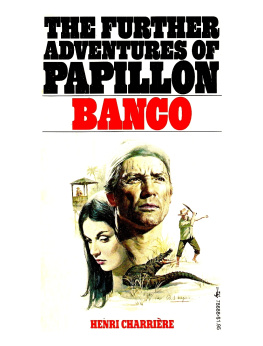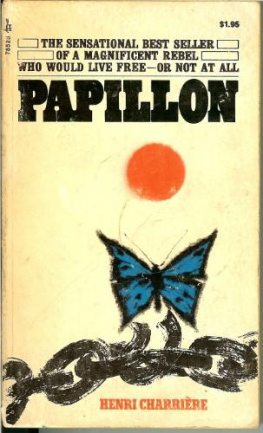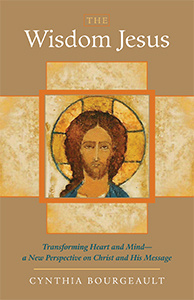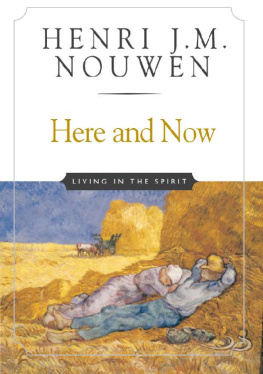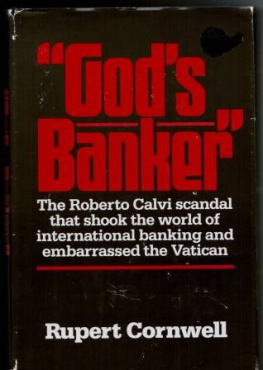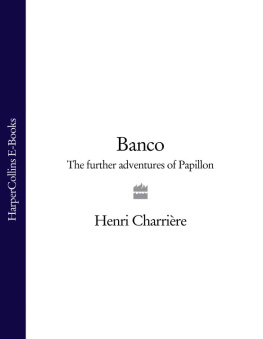Henri Charriere - Banco: The Further Adventures of Papillon
Here you can read online Henri Charriere - Banco: The Further Adventures of Papillon full text of the book (entire story) in english for free. Download pdf and epub, get meaning, cover and reviews about this ebook. year: 2012, publisher: HarperCollins UK, genre: Detective and thriller. Description of the work, (preface) as well as reviews are available. Best literature library LitArk.com created for fans of good reading and offers a wide selection of genres:
Romance novel
Science fiction
Adventure
Detective
Science
History
Home and family
Prose
Art
Politics
Computer
Non-fiction
Religion
Business
Children
Humor
Choose a favorite category and find really read worthwhile books. Enjoy immersion in the world of imagination, feel the emotions of the characters or learn something new for yourself, make an fascinating discovery.
- Book:Banco: The Further Adventures of Papillon
- Author:
- Publisher:HarperCollins UK
- Genre:
- Year:2012
- Rating:3 / 5
- Favourites:Add to favourites
- Your mark:
- 60
- 1
- 2
- 3
- 4
- 5
Banco: The Further Adventures of Papillon: summary, description and annotation
We offer to read an annotation, description, summary or preface (depends on what the author of the book "Banco: The Further Adventures of Papillon" wrote himself). If you haven't found the necessary information about the book — write in the comments, we will try to find it.
Banco: The Further Adventures of Papillon — read online for free the complete book (whole text) full work
Below is the text of the book, divided by pages. System saving the place of the last page read, allows you to conveniently read the book "Banco: The Further Adventures of Papillon" online for free, without having to search again every time where you left off. Put a bookmark, and you can go to the page where you finished reading at any time.
Font size:
Interval:
Bookmark:
BANCO
the Further Adventures of Papillon
by Henri Charriere
translated from the French by Patrick OBrien
Flyleaf:
In Banco, Henri Charriere tells the gripping story of his years on the loose in Venezuela after his escape from Devils Island. A story packed with hair-raising adventure, it is also a heart-warming account of readjustment to life on the outside and the sesolution of a conflict of motives within himself: on the one hand, the lure of the underworld, offering daring and danger, but also the possibility of revenge for the lost years in lonely, stinking cells; on the other, the appeal of going straight in a beautiful country where the free love of generous women promised to soothe even the most restless man.
Running through the story is the theme of the banco--of the chance taken, the stakes risked, when the simple exhilaration of the game inspired Papillon to say to every kind of challenge: Deal me in ... Banco lost? Well, then, banco again! Thus, for instance, when he joined up with an ex-con and got involved in a crooked dice game with tough, suspicious gold- and diamond-miners in the Venezuelan interior. Even when the angry miners murdered his partner and vanished with the profits accumulated during two perilous weeks and Papi, then penniless, escaped only by the skin of his teeth--even then he remained undaunted. So also with his many other, varied adventures... That lust for life, that indomitability of spirit that made Papillon unique have by no means deserted him here.
A number-one best seller in Western Europe, Banco is indeed as vibrantly alive as Papillon--ferocious, funny, tender, and crowded with incident and excitement.
English translation Copyright 1973 by Hart-Davis, MacGibbon.
Originally published in France Copyright 1972 by Editions Robert Laffont S.A.
All rights reserved. No part of this book may be reproduced or utilized in any form or by any means, electronic or mechanical, including photocopying, recording or by any information storage and retrieval system, without permission in writing from the Publisher. Inquiries should be addressed to William Morrow and Company, Inc., 105 Madison Ave., New York, N.Y. 10016.
Design by Helen Roberts
To the memory of Dr. Alex Guibert-Germain, to Madame Alex Guibert-Germain, to my countrymen, the Venezuelans, to my French, Spanish, Swiss, Belgian, Italian, Yugoslav, German, English, Greek, American, Turkish, Finnish, Japanese, Israeli, Swedish, Czechoslovak, Danish, Argentine, Colombian, and Brazilian friends, and all those friends who are faceless but who have done me the honor of writing to me.
Contents
Middle-aged, impoverished by an earthquake and worried about his future, Henri Charrire sat down to write a book to restore his fortunes: it was his first, and he called it Papillon, the name by which he had been known in the underworld of Paris and in the French penal settlements. He had no great opinion of himself as an author and he was quite willing to have it improved, cut about and put into good French; but the first publisher he sent it to happened to employ a brilliant editor who at once realized the exceptional quality of the manuscript and who delivered it to an astonished public in its original state, merely tidying up the punctuation, the spelling and a very few points of style.
That was in 1970, the year of the phnomene Papillon, a phenomenon almost unparalleled in the annals of publishing: it was not only that an extraordinary number of people read the book (850,000 copies were sold in the first few months), but that the readers embraced the whole spectrum of literary opinion, from the Acadmie Franaise to those whose lips moved slowly as they made their fascinated way through the strange adventures of an indomitable man struggling against the society that had sent him to rot in the infamous tropical prisons of Guiana with a life sentence for a murder that he had never committed.
They were all deeply moved by the burning sense of injustice that runs right through the book and that gives it its coherence and validity, but even more by Papillons sheer narrative power, his innate genius for telling a story. This is a literary prodigy, said Franois Mauriac. It is utterly fascinating reading... This new colleague of ours is a master! And he pointed out that it was not enough to have been a transported convict and to have escaped again and again; extraordinary talent was required to give the book its ring of truth and to make its value exactly proportional to its immense success.
The soundness of Mauriacs words can be seen not only from the immense quantities of hopeless manuscripts by other exprisoners (purple characters, but untouched by genius) that flow into publishers offices every week, but also by the baldness of the following summary that is intended to put the reader of this second volume into the picture: the main facts are here, but I am the first to admit that the heart of the matter is lacking.
The facts, then: in 1931 Henri Charrire, alias Papillon, was sentenced to hard labor for life, and in 1933 he was taken away with some hundreds of others in a prison ship bound for South America, for French Guiana. Here he found himself in an appallingly tough and savage world where corruption, terrorism, sodomy and murder were commonplace; he was well equipped for survival in this world, being as tough as any man there, perfectly loyal to his friends and perfectly uncompromising in his hatred of the official establishment, and in time he could have carved out a respectable place for himself. But he had no intention of staying; he had sworn not to serve his unjust sentence, and forty-two days after his arrival he made a break. With two companions (one broke his leg in escaping) he made his way down the Maroni River in a crazy boat; at a remote lepers island they changed boats and so rode out to sea, sailing under the broiling sun day after day until at last they reached Trinidad. On and on to Curaao, where the boat was wrecked; on to Rio Hacha in Colombia, where the wind failed them and they were taken prisoner. Another break, this time with a Colombian friend, and eventually Papillon reached hostile Indian territory, alone and on foot. They took him in, gave him two wives, and then, when at last he would stay no longer, a bag of pearls. Back to Colombia, only to be arrested and imprisoned once more, and, after several abortive breaks, handed over to the French authorities. Then solitary confinement on the Ile Saint-Joseph--a deeply moving account of the silence, the heat and the utter loneliness of that dim, timeless, underground cage-- two years of it. When at last it was over and he was out in the light again, he began to make a raft for another break; but a fellow convict informed upon him, and having killed the informer he went back to solitary--an eight years sentence cut to nineteen months for rescuing a little girl from the sharks. Another attempt at escape; transfer to Devils Island; and then the final break at last, riding two sacks of coconuts through the shark-infested sea to the mainland. A new boat and a new series of adventures brought him to Venezuela and to the Venezuelan penal settlement at El Dorado, where he was held on the charge of being a rogue and a vagabond. But a coup detat in Caracas brought the promise of release, and the last pages of the book show Papillon, equipped with genuine papers at last, and dressed in good civilian clothes, ready to walk out into freedom after fourteen years of being in prison or on the run. That is where the present volume starts, and from now on his story is told in his own infinitely more living words.
PATRICK OBRIAN
What you think of yourself matters more than what others think of you
(author unknown to Papillon)
Next pageFont size:
Interval:
Bookmark:
Similar books «Banco: The Further Adventures of Papillon»
Look at similar books to Banco: The Further Adventures of Papillon. We have selected literature similar in name and meaning in the hope of providing readers with more options to find new, interesting, not yet read works.
Discussion, reviews of the book Banco: The Further Adventures of Papillon and just readers' own opinions. Leave your comments, write what you think about the work, its meaning or the main characters. Specify what exactly you liked and what you didn't like, and why you think so.

